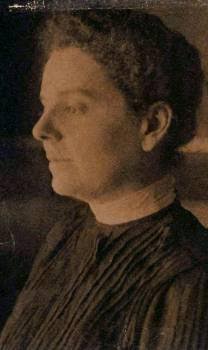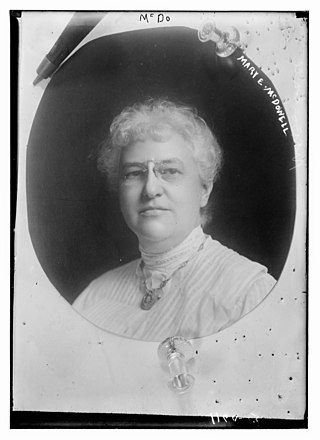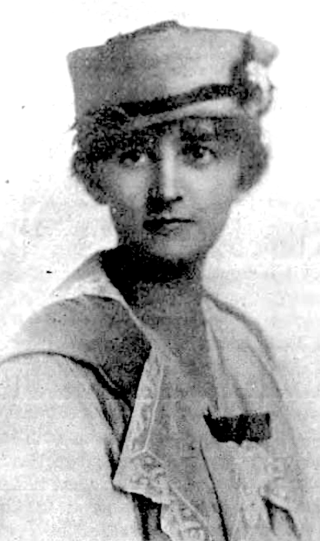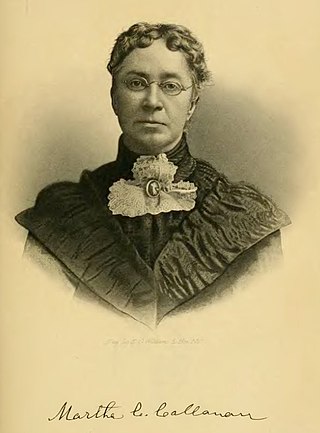
Laura Jane Addams was an American settlement activist, reformer, social worker, sociologist, public administrator, philosopher, and author. She was a leader in the history of social work and Women's suffrage. Addams co-founded Hull House, one of America's most famous settlement houses, in Chicago, Illinois, providing extensive social services to poor, largely immigrant families. Philosophically a "radical pragmatist", she was arguably the first woman public philosopher in the United States. In the Progressive Era, when even presidents such as Theodore Roosevelt and Woodrow Wilson identified themselves as reformers and might be seen as social activists, Addams was one of the most prominent reformers.

Hull House was a settlement house in Chicago, Illinois, that was co-founded in 1889 by Jane Addams and Ellen Gates Starr. Located on the Near West Side of Chicago, Hull House, named after the original house's first owner Charles Jerald Hull, opened to serve recently arrived European immigrants. By 1911, Hull House had expanded to 13 buildings. In 1912, the Hull House complex was completed with the addition of a summer camp, the Bowen Country Club. With its innovative social, educational, and artistic programs, Hull House became the standard bearer for the movement; by 1920, it grew to approximately 500 settlement houses nationally.

Mary Kenney O'Sullivan, was an organizer in the early U.S. labor movement. She learned early the importance of unions from poor treatment received at her first job in dressmaking. Making a career in bookbinding, she joined the Ladies Federal Local Union Number 2703 and organized her own group from within, Woman's Bookbinding Union Number 1.

Louise Frankel Rosenfield Noun was a feminist, social activist, philanthropist, and civil libertarian.

Louise DeKoven Bowen was an American philanthropist, civic leader, social reformer, and suffragist. She was born to a wealthy family and raised with a strong sense of noblesse oblige. She made substantial financial donations to numerous organizations, raised funds from her association with Chicago's elite families, and while not trained as a social worker, she served in the field as a competent and respected policy maker and administrator. She worked with the settlement movement at Hull House, court reform for youth via the Juvenile Protective Association, and numerous women's clubs and women's suffrage organizations. A primary passion of hers was the reform of dance halls in Chicago. At the end of her 94 years, she had provided care to the impoverished and disenfranchised through her extensive public service and activism, especially attending to "the welfare and betterment of women, children, and their families."

Mary Jane (Whitely) Coggeshall was an American suffragist known as the "mother of woman suffrage in Iowa". She was inducted into the Iowa Women's Hall of Fame in 1990.

Mary Rozet Smith was a Chicago-born US philanthropist who was one of the trustees and benefactors of Hull House. She was the partner of activist Jane Addams for over thirty years. Smith provided the financing for the Hull House Music School and donated the school's organ as a memorial to her mother. She was active in several social betterment societies in Chicago at the turn of the 20th century.

Mary Eliza McDowell was an American social reformer and prominent figure in the Chicago Settlement movement.

Mary Taylor Reeves Foulke Morrisson was an American suffragist and social activist. She was a pioneer in the Women's rights movement and was a prominent member of the Board of Trustees at Connecticut College for 28 years. Morrisson graduated from Bryn Mawr College in 1899, where she studied chemistry, biology, and government. In 1900, she married James William Morrisson, president of Fuller-Morrisson Co., wholesale druggists.

Annie Nowlin Savery was an American suffragist and philanthropist based in Des Moines, Iowa. She is known as a pioneer feminist and activist for woman suffrage. She began taking part in the woman suffrage movement in the 1860s, and became a leader in the county and state, speaking widely and helping establish organizations to support it.

Minnie Bronson was an American anti-suffragist activist who was general secretary of the National Association Opposed to Woman Suffrage.

Ella Hamilton Durley was an American educator, newspaper editor, and journalist. She was also a peace activist and supported woman's suffrage. Durley did noteworthy work on the Saturday Mail, a Des Moines weekly publication, but her professional life was mainly given to the Des Moines Daily News, of which her husband, Preston B. Durley and her brother, John J. Hamilton, with herself, were the principal owners. Under the pen name of "Judith Jorgenson", she conducted a column of stories of real life, "Around the Evening Lamp", for many years, and it was considered especially creditable.

Socialhousekeeping, also known as municipal or civil housekeeping, was a socio-political movement that occurred primarily through the 1880s to the early 1900s in the Progressive Era around the United States.

The Des Moines Women's Club, founded in 1885 as the women's club movement swept through the United States, today serves the Des Moines community by providing scholarships, support for the local arts community, and other civic projects.

Emma Adena Miller Rich was an American social worker, philanthropist, and activist. She was head resident of Hull House from 1935 to 1937, after the death of Jane Addams.

Efforts toward women's suffrage began early in Iowa's history. During the territory's Constitutional Convention, discussions on both African American and women's suffrage took place. Early on, women's rights were discussed in the state by women such as Amelia Bloomer and petitions for suffrage were sent to the Iowa state legislature. While African American men earned the right to vote in 1868, women from all backgrounds had to continue to agitate for enfranchisement. One of the first suffrage groups was formed in Dubuque in 1869. Not long after, a state suffrage convention was held in Mount Pleasant in 1870. Iowa suffragists focused on organizing and lobbying the state legislature. In 1894, women gained the right to vote on municipal bond and tax issues and also in school elections. These rights were immediately utilized by women who turned out in good numbers to vote on these issues. By the 1910s, the state legislature finally passed in successive sessions a women's suffrage amendment to the state constitution. This resulted in a voter referendum to be held on the issue on June 5, 1916. The campaign included anti-suffrage agitation from liquor interests who claimed that women's suffrage would cause higher taxes. The amendment was defeated, though a subsequent investigation turned up a large amount of fraud. However, the election could not be invalidated and women had to wait to vote. On July 2, 1919, Iowa became the tenth state to ratify the Nineteenth Amendment.

This is a timeline of women's suffrage in Iowa. Women's suffrage work started early in Iowa's history. Organizing began in the late 1960s with the first state suffrage convention taking place in 1870. In the 1890s, women gained the right to vote on municipal bonds, tax efforts and school-related issues. By 1916, a state suffrage amendment went to out to a voter referendum, which failed. Iowa was the tenth state to ratify the Nineteenth Amendment in 1919.

Martha Callanan (1826-1901) was a woman's suffrage advocate, newspaper publisher and philanthropist. She was born in Albany County New York and moved to Des Moines, Iowa with her husband James C. Callanan in 1863 and her home soom became the unofficial headquarters for the local women's suffrage movement.

Anna E. Nicholes was an American social reformer, civil servant, and clubwoman associated with women's suffrage and the settlement movement in Chicago. She devoted her life to charitable and philanthropic work.



















